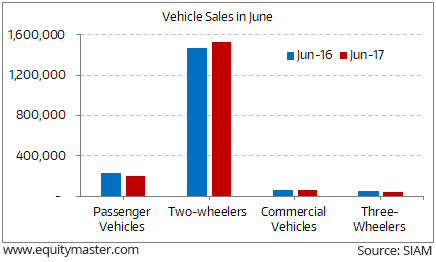- Home
- Todays Market
- Indian Stock Market News August 21, 2017
Sensex Trades in Red; Auto Stocks Witness Selling Mon, 21 Aug 01:30 pm
After opening the day flat, share markets in India continued to witness selling pressure and are currently trading in red. Sectoral indices are trading on a mixed note with stocks in the metals sector and stocks in the banking sector trading in green, while stocks in the auto sector and stocks in the IT sector are leading the losses.
The BSE Sensex is trading down by 110 points (down 0.3%), and the NSE Nifty is trading lower by 25 points (down 0.3%). Meanwhile, the BSE Mid Cap index is trading down by 0.4%, while the BSE Small Cap index is trading down by 0.2%. The rupee is trading at 64.04 to the US$.
In news from the Goods and Service Tax (GST) space. According to a leading financial daily, the government is all set to bring in an ordinance as early as next week, to increase ceiling on cess to 25% from the present 15% over the peak rate of 28% GST on luxury cars and sports utility vehicles (SUVs).
The ordinance seeks to restore tax revenue from the automobile industry that unintentionally got affected in the transition to the new indirect tax regime.
The finance ministry on 7 August said the Council chaired by finance minister Arun Jaitley had recommended to the central government to move legislative amendments needed for raising the maximum ceiling of cess that can be levied on motor vehicles including sports utility vehicles (SUVs) to 25% from the present 15%.
Makers of SUVs and luxury cars have criticized the GST Council's plan to raise the cess, warning the move will lead to production cuts and job losses and dent the "Make in India" initiative.
he decision has upset the growth plans of the luxury car industry, which had seen a flat performance in 2016, owing to demonetisation and the ban on 2,000cc diesel cars in the National Capital Region for the first eight months of the year.
The decision to increase the cess was taken after the Council found the taxes on these cars were lower under the GST regime than the indirect taxation system.
Prices of most such vehicles had turned significantly cheaper in most states following the introduction of the GST on July 1. However, uncertainties over GST implementation pulled down sales of passenger vehicles (cars, utility vehicles and vans) in June.
Car Sales Hit GST Bump
Domestic passenger vehicle sales declined by 11.2% to 198,399 units in June from 223,454 units in the same month last year, according to data released by the Society of Indian Automobile Manufacturers (SIAM). This is the first decline in six months as dealers avoided picking up fresh stocks from companies ahead of GST implementation with a view to avoid transitional loss. Similarly, this decline was the steepest fall in 51 months, since March 2013, when sales declined by 13%. Most players, including Hyundai, Mahindra & Mahindra, Toyota and Tata Motors, reported a decline.
The overall automotive industry witnessed some volatility during the first quarter of FY18, as the market experienced uncertainty post the BS-IV transition issues and prior to GST implementation, and automakers, besides offering pre-GST discounts, made efforts to re-align inventories.
Our colleague Vivek Kaul has studied the finer aspects of the GST and predicted what could go right and wrong.
Download his special report - The Good, the Sad and the Terrible (GST).
In news from stocks in the oil and gas sector. Indian Oil Corporation (IOC) share price is in focus today, after the company struck a deal with the Odisha government for tax benefits for its Pradip refinery.
Odisha government, which had withdrawn tax incentives to IOC's Rs 345 billion Pradip refinery as agreed to restore some of the tax breaks including a Rs 7-billion per annum of interest-free loan.
The interest free loan would be for a period of 15 years. The state had agreed to provide total deferment of VAT.
Indian Oil Corp (IOC) and the state government agreed to the revised terms at the meeting called at the behest of the oil minister Dharmendra Pradhan.
The Odisha government had on February 22 written to IOC, its single-biggest investor, saying it is withdrawing the promised 11-year deferment on payment of sales tax on Paradip refinery products sold in the state.
The withdrawal was to cost Rs 20 billion to IOC this year and was to progressively increase every year as more petrol, diesel and petrochemicals are sold within the state.
The company however, dragged the state government to court for walking back on its commitment and has not paid VAT on products sold in the state since commissioning of the refinery last year.
However, post the latest agreement, IOC will deposit applicable VAT or GST on products sold. While, the Odisha government will pay the viability gap fund in the form of interest-free loan in each quarter.
At the time of writing, IOC share price was trading up by 0.2%.
For information on how to pick stocks that have the potential to deliver big returns, download our special report now!
Read the latest Market Commentary



Equitymaster requests your view! Post a comment on "Sensex Trades in Red; Auto Stocks Witness Selling". Click here!
Comments are moderated by Equitymaster, in accordance with the Terms of Use, and may not appear
on this article until they have been reviewed and deemed appropriate for posting.
In the meantime, you may want to share this article with your friends!